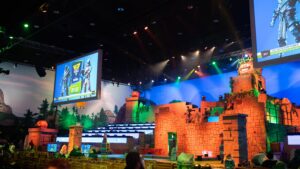
By Sonya Callan
For many of us the X-box or Playstation sitting in the corner attached to screens and controllers is a great way to while away a few hours playing online games and chatting with friends whilst attempting to break through to new levels within the online environments of Minecraft, Fortnite, Call of Duty or League of Legends.
For the 222.9m (Newzoo) esports enthusiasts around the globe the world of online gaming is more than just a hobby. The most competitive gamers are well known and highly skilled and are viewed as heroes like the most famous football or golf stars. Unlike the traditional sports stars their arenas are online where games are played in highly organised competitive environments. Players can play in team-oriented multiplayer online battle arenas (MOBAs), single player games, survival battle royales, and virtual reconstructions of physical sports.
The industry has come a long way since the birth of esports in 1958 when ‘Tennis for Two’ was first played as part of an exhibition with a small audience of players and college students. Moving through the years and we fast forward to 1980 when an Atari ‘Space Invaders’ event gathered 10,000 players together and a decade later saw the launch of the Nintendo World Championships which took place over 9 months in 29 cities in the U.S. until the final event in December 1990.
With the major growth of esports over the years and the growing interest from the general public, the world of online gaming has moved out of the homes and bedrooms of the players to large scale event spaces usually filled with football fans. The event organisers themselves could be seen as ahead of their time in the world of hybrid style events, whilst the players and ticket holders are enjoying the spectacle of a live event, there are also millions of other viewers tuning in from the comfort of their own homes.
“With the major growth of esports over the years and the growing interest from the general public, the world of online gaming has moved out of the homes and bedrooms of the players to large scale event spaces usually filled with football fans.”
Using the 2017 Intel Extreme Masters in Katawice as one example the number of attendees at the venue was a staggering 173,000 but the event attracted an unbelievable 46 million viewers online. In 2019 at the League of Legends World Championships in Paris there was a smaller live audience of 15,000 but nearly 100 million online viewers watched their favourite teams compete for the prize money of $250million and a trophy designed by Louis Vuitton.
With such high-profile players, viewership figures and the opportunity to be involved in the one of the fastest growing industries, event managers would be wise to look at opportunities to host gaming events should an enquiry come their way. Whilst there are the usual event requirements, space to be booked, online booking systems and sponsorship etc, the most vital element is technology and with the huge leaps made in this field over the past 12 months the expertise is there now. So, grab your controllers, headsets and keyboards and join the new world of esports.
